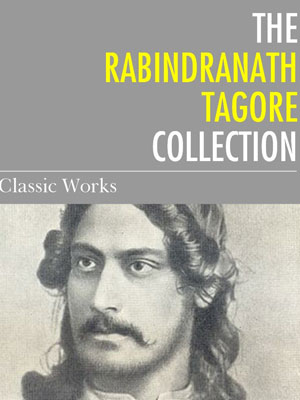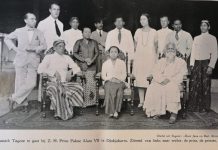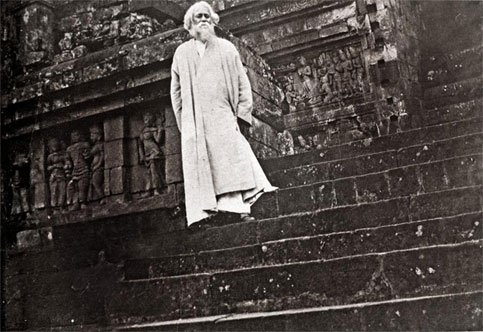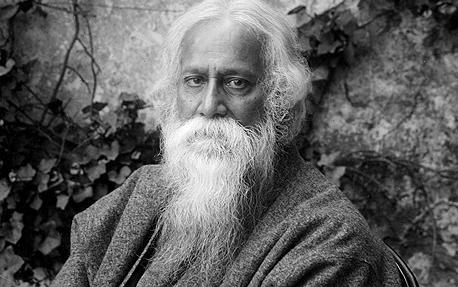25. Poem ‘Bansi’ (Flute) of the book Parishesh (The End) written in 1932.
Translator’s note: Many take Tagore as an aristocrat who was by succession a Zemindar (landlord), away from the hard realities faced by the common people close to the poverty line. This poem negates this idea and shows his deep insight into the tragedy of the deprived class of the society. Those who think that his sympathy for the poor was a poetic luxury, will be well advised to visit particularly Sriniketan, close to Santiniketan, where his Visva Bharati University (=World University) situates, for a glimpse of the fantastic work he did for development of rural economy by way of promotion of vocational training on various crafts side by side with his mass educational programmes within all the constraints of his time. This may be convincing that he was not a ‘ivory tower’ poet.
At Kinu Milkman’s Lane
I stay quite to my bane
In a building two storied,
On the ground floor the gate is grilled
In my room wayside
Walls eroded, do not hide
Their brickwork, with sand shed
Here and there, and graffiti of damp displayed.
A portrait of Lord Ganesh
On a canvas no way fresh,
Who helps us achieve a score
Or so supposed, is fixed on the door.
Besides me, another creature
There, on the same rent, does feature
A lizard it is
Difference, it gets its meal more at ease.
A junior clerk at a merchant office,
My salary twenty five rupees.
With their son’s tuition blessed,
At Datta’s my meal is dished.
At Sealdah station
I spend the evenings for no emotion,
But to save the cost of light
Bear with the engines’ sibilant or such plight,
As they whistle, the passengers’ hurry,
And the porters’ scurry.
Ten thirty as the clock will show,
To my dark recess I’ll go.
Lives in a village my auntie
By the river Dhaleswari
Daughter of her brother-in-law,
The hour was without flaw
For her wed with this destitute
That auntie planned astute.
Indeed the hour brought luck
As judged by the almanac
That very hour I did abscond
Thus the lass eluded my bond
And I backed to square one
Her passage to my abode to shun
To my dismay
Though she visits my mind every day
Clad in a Dhakai Sari
Forehead with vermillion smeary.
At the thick of monsoon,
Again, no way a boon,
Cost rises for tram ride
With salary cuts by its side
The nabs of the street
Mango skin, fish fins, kitten corpse et al greet
To pile and ferment
Their pungency to vent.
The umbrella with many a hole
As my fined salary, meets no goal.
Attired for the office,
Gopikanta Gonsai still does not miss
His sense of humour
From which I’m far.
The dark of the rainy day
Makes its way
Into my damp room
To trap me in a morbid doom,
With a world in limbo
As days and nights go.
At the turn of the lane
Stays Kantababu who would fain
To dress his long hair,
Posh, his round eyes stare
l Plays cornet as his hobby
In the loath of this lane shabby
At times at dead of night
Or at dawn’s twilight
Even in the light and shade
As in the afternoon the day will fade
Or of a sudden in the evening
Sindhu Baroan (*) would spring (* an Indian Raga)
To flood the whole sky
With eternal separational sigh,
At once it is obvious,
This lane is a falsity enormous
Like the drunk’s rigmarole
Suddenly the message does unroll
Between Akbar Badsha and Haripada clerk
Stands no dividing mark.
The music’s compassion
To the same utopia leads on.
The bruised umbrella and the royal one
Both for the same fate done.
Where this music holds true
In the eternal dusk that never knew
A break in the flow
Of Dhaleswari, and waits so
One at the yard,
That the river’s shore neared,
By the Tamals (*) shaded deep (* a type of Indian tree)
She, through her veil keeps peep
Clad in Dhakai Sari
Forehead with vermillion smeary. (*) (* As per Bengali ritual the Bridegroom smears the forehead of the Bride with vermillion at the nuptial hour)






